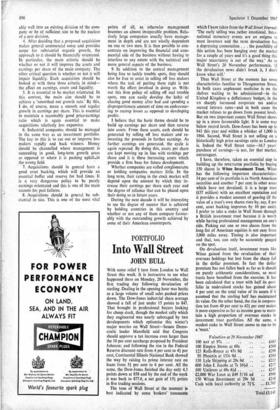Into Wall Street
PORTFOLIO JOHN BULL
With some relief I turn from London to Wall Street this week. It is instructive to see what happened there on Monday, 20 November, the first trading day following devaluation of sterling. Dealing in the opening hour was hectic as a large volume of small sales pushed prices down. The Dow-Jones industrial share average showed a fall of just under 15 points to 847. That brought in professional buyers looking for cheap stock, though the modest rally which they engineered was nearly sabotaged by two developments which epitomise this winter's ' major worries on Wall Street—Senate Demo- cratic leader Mansfield said that Congress should approve a tax increase even larger than the 10 per cent surcharge proposed by President Johnson; and following the rise in the Federal Reserve discount rate from 4 per cent to 4+ per cent, Continental Illinois National Bank showed the way by raising its prime interest rate on loans from 5+ per cent to 6 per cent. All the same, the Dow-Jones finished the day only 4.3 points down at 858 and by the end of the week it was back to 877.6, .a net gain of 15f points in five trading sessions.
The tone of Wall Street at the moment is best indicated by some brokers' comments which I have taken from the Wall Street Journal: `The early selling was _rather emotional. Inter- national monetary events are an enigma to most investors and the term devaluation has a depressing connotation . . . the possibility of this action has been hanging over the market for a couple of years and it's a good thing this major uncertainty is out of the way.' As to Wall Street's 20 November performance, 'if the devaluation news didn't break it, I don't know what will.'
Thus Wall Street at the moment has some characteristics familiar to Throgmorton Street. In both cases unpleasant medicine is on the shelves waiting to be administered—in the United Kingdom a deflationary budget, in the us sharply increased corporate tax and/or record interest rates—and in both cases the market refuses to go down from present levels. But on two important counts Wall Street shows up in, a more favourable light. It is some way below record levels. Dow-Jones has been up to 943 this year and within a whisker of 1,000 in 1966. Second, Wall Street is not selling on a historically high price earnings ratio as London is. Indeed the Wall Street ratio-16.7 years' purchase of earnings—is not, for that market, extravagant.
I have, therefore, taken an essential step in building up the SPECTATOR portfolio by buying 150 shares in Witan Investment Trust. Witan has the following important characteristics: 34 per cent of its portfolio is in North American securities and another 7 per cent in other areas which have not devalued; it is a large trust an million) with an excellent reputation and it provides a modest amount of gearing (if the value of a trust's own shares rises by, say, 8 per cent, asset backing improves by 10 per cent). I prefer to take a, stake in Wall Street through a British investment trust because it is worth while having professional management on one's side. Picking out one or two shares from the long list of American equities is not easy from 3,000 miles away. Timing is also important and that, too, can only be accurately 'gauged on the spot.
On devaluation itself, investment trusts like Witan gained from the revaluation of their overseas holdings but lost from the sharp fall in the dollar premium. In fact the dollar premium has not fallen back as far as it should on- purely arithmetic considerations, so most trusts have benefited from the exercise. It has been calculated that a trust with half its port- folio in undevalued stocks has gained about 4 per cent on the total value of its assets if it assumed that the sterling half has maintained its value. On the other hand, the rise in corpora- tion tax from 40 per cent to 421 per cent makes it more expensive as far as income goes to main- tain a high proportion of overseas stocks in investment trust portfolios. All the same, a modest stake in Wall Street seems to me°to be a 'must.'
Valuation at 29 November 1967 100 BAT at 97s 100 Empire Stores at 60s 125 Rolls-Royce at 47s 9d 50 Phoenix at 153s 9d ..
150 Lyle Shipping at 29s 9d .. 600 John I. Jacobs at 7s 101d .. 100 Unilever at 49s 44d £2,000 War Loan at £49 5/16 xd 150 Witan Investment at 29s 3d Cash with local authority at 71%
Total £5,143
• •
£485
£300
£298 £384 £223 £237 £247 £986 £218
.. £1,765


































 Previous page
Previous page